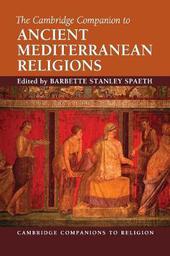
|
The Cambridge Companion to Ancient Mediterranean Religions
Paperback / softback
Main Details
| Title |
The Cambridge Companion to Ancient Mediterranean Religions
|
| Authors and Contributors |
Edited by Barbette Stanley Spaeth
|
| Series | Cambridge Companions to Religion |
|---|
| Physical Properties |
| Format:Paperback / softback | | Pages:378 | | Dimensions(mm): Height 229,Width 152 |
|
| Category/Genre | Ancient religions and mythologies |
|---|
| ISBN/Barcode |
9780521132046
|
| Classifications | Dewey:292 |
|---|
| Audience | | Tertiary Education (US: College) | |
|---|
| Illustrations |
13 Halftones, unspecified
|
|
Publishing Details |
| Publisher |
Cambridge University Press
|
| Imprint |
Cambridge University Press
|
| Publication Date |
25 November 2013 |
| Publication Country |
United Kingdom
|
Description
In antiquity, the Mediterranean region was linked by sea and land routes that facilitated the spread of religious beliefs and practices among the civilizations of the ancient world. The Cambridge Companion to Ancient Mediterranean Religions provides an introduction to the major religions of this area and explores current research regarding the similarities and differences among them. The period covered is from the prehistoric period to late antiquity, that is, ca.4000 BCE to 600 CE. The first nine essays in the volume provide an overview of the characteristics and historical developments of the major religions of the region, including those of Egypt, Mesopotamia, Syria-Canaan, Israel, Anatolia, Iran, Greece, Rome and early Christianity. The last five essays deal with key topics in current research on these religions, including violence, identity, the body, gender and visuality, taking an explicitly comparative approach and presenting recent theoretical and methodological advances in contemporary scholarship.
Author Biography
Barbette Stanley Spaeth is Associate Professor of Classical Studies and Co-Director of the Institute for Pilgrimage Studies at the College of William and Mary. Her specialty is Greek and Roman religion. She is author of The Roman Goddess (1996) and of articles in Daughters of Hecate: Women and Magic in the Ancient World (forthcoming), Rome and Religion: A Cross-Disciplinary Dialogue on the Imperial Cult (2011) and Sub Imagine Somni: Nighttime Phenomena in Greco-Roman Culture (2010). Her work has been published in American Journal of Archaeology, Hesperia, Historia and Classical World. Professor Spaeth has held fellowships at the American School of Classical Studies in Athens and the American Academy in Rome. She has received grants from the National Endowment for the Humanities, Loeb Classical Library Foundation, Center for Hellenic Studies and the Memoria Romana Project of the Max-Planck Society. She is co-founder and past president of the Society for Ancient Mediterranean Religions, as well as past president of the Alumni/ae Association of the American School of Classical Studies, Athens.
ReviewsAdvance praise: "I highly recommend this rich and informative resource volume to undergraduate and graduate students, as well as to scholars. It has been judiciously researched by some of the leading scholars in the field and employs an interdisciplinary, historical, and comparative introduction to the most important features, beliefs, practices, rituals, and institutions of the major religions in the ancient Mediterranean world." - Shalom Paul, The Hebrew University of Jerusalem "Spaeth's well-conceived volume provides an excellent gateway, for seasoned scholars and beginning students alike, to the core materials and central issues in the study of diverse ancient Mediterranean religions. Taken together, these essays demonstrate how rich and vibrant this field has become - and just how much remains to be done." - Ra'anan Boustan, University of California, Los Angeles "An intelligent and stimulating overview from diverse perspectives that produce a coherent whole. This book is a model of an interdisciplinary and comparative approach for an important emerging field." - Karl Galinsky, University of Texas, Austin "More than a dozen American scholars embark on a truly comparative study of Mediterranean religion, from the Neolithic stelae of Goebekli Tepe onward. Conceptions of the divine, sacrifice, divination, sacred space and time, priesthoods and politics - these keywords make the various religions described in the book accessible across different cultures." - Joerg Rupke, University of Erfurt
|